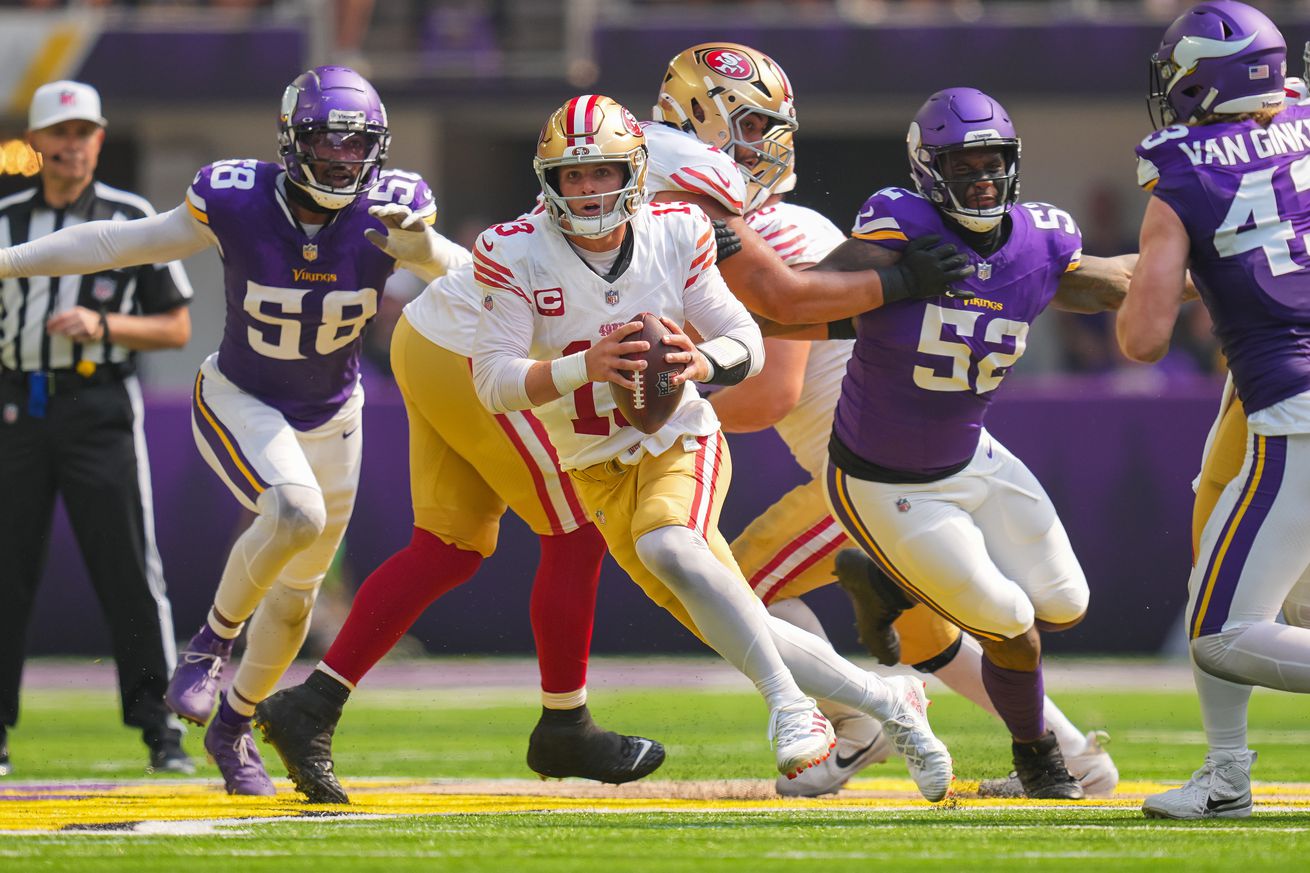
The 49ers came flat-footed in a rough road game early in the season
After a big-time victory in Week 1 over the New York Jets, the San Francisco 49ers fell flat in Week 2, losing to the Minnesota Vikings 23-17 at U.S. Bank Stadium in their first road game of the season.
It was an ugly performance from the 49ers, who made one too many mistakes that ultimately led to their demise, leading to their eighth straight loss on the road to Minnesota, with their last victory at U.S. Bank coming back in 1992.
Here are three quick takeaways from the 49ers 23-17 loss to the Vikings.
Turnovers
Coming into the game, I had highlighted three major keys for a 49ers victory: Stopping Aaron Jones, having Brock Purdy beat the blitz, and winning the turnover battle.
San Francisco struggled in all three aspects, which were key factors in their loss, but the turnovers were the most brutal part of the day.
The 49ers had a blocked punt on their second drive, which was a wild play that led to Minnesota starting inside the San Francisco 25-yard line. The defense ultimately held up, but the Vikings got three points out of that opportunity.
On the ensuing two drives, San Francisco looked to be aggressive, going for it on fourth down to end both drives.
The first drive saw the 49ers drive all the way to the Vikings two-yard line, but felt short in converting a touchdown, turning it over on downs. Minnesota responded immediately with a 98-yard touchdown drive, with Justin Jefferson making a major 97-yard play to give the Vikings a 10-0 lead.
Following that, the 49ers went again on 4th down, failing to convert on 4th & 2 at the Minnesota 43-yard line. The Vikings didn’t get any points on the ensuing drive, but it killed another scoring chance for San Francisco, who desperately needed points on Sunday.
Brock Purdy threw an interception on the second drive of the second half, which led to a one-play touchdown drive for Minnesota, spreading the lead to 20-7. Then, Purdy had a fumble/interception after the 49ers began to drive, killing another drive, although the Vikings couldn’t do much with it.
Linebacker Fred Warner was amazing, forcing two different takeaways, but the blocked punt, two turnover on downs, and the two true turnovers, were way too costly for San Francisco in the loss.
Brock Purdy
It was clear that quarterback Brock Purdy was going to need to be effective against the blitz coming into the game. Brian Flores looked to pressure him early and often with stunts and extra rushers, and the 49ers starter struggled at times on Sunday, leading to inopportune mistakes.
Purdy’s two turnovers were directly created by extra pressure sent by the Vikings defense, while several favorable situations were killed for San Francisco.
Games like these are a true challenge for Purdy, but he has played well against the blitz in the past, which is why there wasn’t much of a concern entering the season.
In all fairness, the 49ers signal-caller didn’t deliver enough in key moments for the 49ers, leading to a number of broken drives, as Purdy was sacked a whopping six times on Sunday.
Pat Jones II was able to get some pressure off the edge, working against Trent Williams and the left side of the offensive line, but the Vikings as a whole got into the backfield and made Purdy’s life difficult in Year 3.
It seemed at times the 49ers committed to the pass a little too much early on, especially given how Jordan Mason was churning on the ground, but this wasn’t the best performance from Brock Purdy, especially when extra rushers were getting home too often.
Third down defense
For the second straight week, third down defense was a concern for the 49ers.
After allowing the Jets to convert on 60 percent of their third downs in Week 1, including 100 percent on all of their 3rd & 7+ chances, San Francisco struggled again in Week 2, with the Vikings converted 7/12 of their third downs.
In this game, Minnesota converted on a 3rd & 16 and 3rd & 10 on the same drive to end the half, allowing them to score a big field goal ahead of halftime.
Then, on a major 14-play, 62-yard drive that lasted 6:46 of game clock late in the fourth quarter, Minnesota converted on three straight third downs to move the chains deep into the red zone, which was crucial in helping them seal the game.
Defensive coordinator Nick Sorensen faced a big challenge with Kevin O’Connell’s offense, and it’s fair to say that Minnesota took advantage of the defense’s holes when it mattered, especially on third down.
The defense didn’t have a bad performance necessarily, despite Minnesota going for 403 yards on 7.5 yards per play, as they were put in a number of poor positions.
But, they need to be better on third downs going forward and Sorensen will need to make a change to improve in that department.